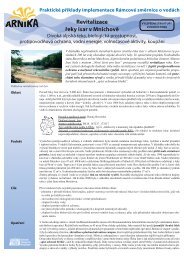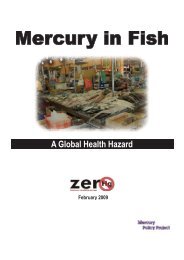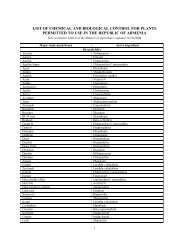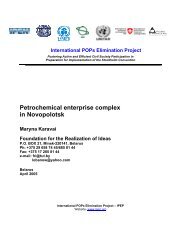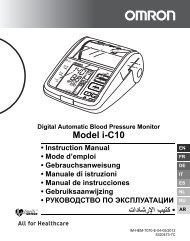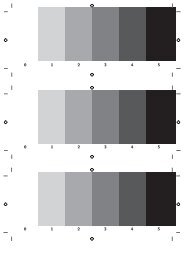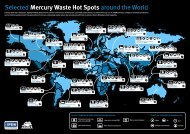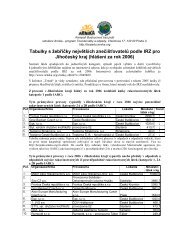Market analysis of some mercury-containing products and their ...
Market analysis of some mercury-containing products and their ...
Market analysis of some mercury-containing products and their ...
You also want an ePaper? Increase the reach of your titles
YUMPU automatically turns print PDFs into web optimized ePapers that Google loves.
Results were tallied <strong>and</strong> in addition, samples <strong>of</strong> batteries <strong>and</strong> skin-lightening <strong>products</strong><br />
were collected for further <strong>analysis</strong>.<br />
From the surveys, respondents <strong>of</strong>fered a wide range <strong>of</strong> reactions regarding awareness<br />
about, <strong>and</strong> the availability <strong>of</strong>, <strong>products</strong> that traditionally – or continue to – contain mer-<br />
cury. In addition, the survey identified a wide variability among the countries in <strong>their</strong> ef-<br />
forts to address the production, sale, <strong>and</strong> use <strong>of</strong> those <strong>products</strong>. Dental <strong>and</strong> health care<br />
pr<strong>of</strong>essionals, <strong>some</strong> <strong>of</strong> the most highly-educated individuals in any country, are wellrespected<br />
by the public as a source <strong>of</strong> information on public health issues. In every<br />
country surveyed, they were extremely knowledgeable about <strong>mercury</strong>’s toxicity <strong>and</strong> potential<br />
impacts on health. The survey found virtually total awareness <strong>and</strong> underst<strong>and</strong>ing<br />
among dental <strong>and</strong> medical pr<strong>of</strong>essionals (90% - 100%) on <strong>mercury</strong>’s toxicity with very<br />
little belief that <strong>mercury</strong>’s threat was overstated. The only exception was one Asian<br />
country where all interviewed dentists know that <strong>mercury</strong> is toxic, but only slightly more<br />
than 50% were aware <strong>of</strong> the risks posed by it to human health <strong>and</strong> the environment. In<br />
most instances, the ability <strong>of</strong> dentists <strong>and</strong> doctors to speak about <strong>mercury</strong> issues was<br />
compromised by <strong>their</strong> use <strong>of</strong> <strong>mercury</strong> in <strong>their</strong> everyday practices.<br />
Consumer knowledge about <strong>mercury</strong> <strong>of</strong>ten paralleled the strength <strong>of</strong> policies present<br />
for addressing its use. In countries where <strong>mercury</strong> content restrictions were placed on<br />
<strong>products</strong> <strong>and</strong>/or the government either certified <strong>mercury</strong>-free or required <strong>mercury</strong>-free,<br />
citizens <strong>and</strong> merchants showed <strong>of</strong>ten greater awareness about <strong>mercury</strong>’s threat <strong>and</strong><br />
the presence or absence <strong>of</strong> <strong>mercury</strong> in consumer <strong>products</strong> when making <strong>their</strong> choices<br />
for purchase.<br />
Another segment <strong>of</strong> the population that regularly interacts with consumers, retail merchants,<br />
were only aware <strong>of</strong> <strong>mercury</strong>’s presence or threat where the presence <strong>of</strong> either<br />
a regulation, government instituted seal or an implied <strong>mercury</strong>-free production credential<br />
was given to manufacturers <strong>of</strong> a <strong>of</strong> well-renowned product label. In these communities,<br />
the merchants were quick to claim <strong>mercury</strong>-free benefit <strong>and</strong> tout the benefits <strong>of</strong> a<br />
safe <strong>and</strong> healthy product.<br />
While <strong>mercury</strong>-<strong>containing</strong> thermometers were still used more <strong>of</strong>ten, <strong>mercury</strong>-free<br />
thermometers were in wide use in hospitals <strong>and</strong> doctor <strong>of</strong>fices in most countries surveyed.<br />
Especially in Asian countries <strong>mercury</strong>-free thermometers were in use in only<br />
about 25 – 30% <strong>of</strong> all visited hospitals <strong>and</strong> doctors’ practices, in one country there was<br />
found no substitution at all. Ease <strong>of</strong> use, durability <strong>and</strong> safety issues were the greatest<br />
2



